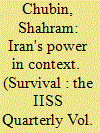| Srl | Item |
| 1 |
ID:
086173


|
|
|
|
|
| Publication |
2009.
|
| Summary/Abstract |
Iran-US relations - strained at the best of times since the 1979 Iranian revolution - have never been worse than during the past six years, due to the much more intense interaction between the two states since the revelations about Iran's nuclear ambitions and the United States' invasion of Iraq. The United States sees Iran as a potential strategic rival, while Tehran views the American presence in the Middle East as a potential existential threat. This has led to zero-sum thinking and has raised the stakes correspondingly. In the process there has been an inflation of the Iranian threat, which is poorly understood and often exaggerated. Depicting Iran as a military threat obscures the real political threat the country poses to its region; Iran's regional behaviour has been neglected and overshadowed by the contentious nuclear issue. However, it is precisely Iran's behaviour and goals which feed concerns about its nuclear ambitions.
It is important to put the Iranian threat in context. In recent years, what was largely a bilateral rivalry between Iran and the United States has become displaced and expanded throughout the region: Palestine, Syria, Lebanon, Iraq and the Gulf states have all been affected by the growing tension, and there are signs that Iranian influence is becoming stronger in these areas. Iran's more active and effective diplomacy in the Middle East is due to the conjunction of three separate trends, all of which are reversible. The first is the emergence of a permissive regional environment, hospitable to Iran's diplomacy; the second, the ascension of an ideological and hardline conservative government in Tehran, predisposed to a more activist diplomacy; and third, the oil windfall, which freed resources for seeding movements and clients supportive of Iranian goals. However, the influence that has accrued to Iran as a result of these trends is transitory and precarious, and there are constraints on Iran becoming a regional superpower.
|
|
|
|
|
|
|
|
|
|
|
|
|
|
|
|
| 2 |
ID:
091058


|
|
|
|
|
| Publication |
2009.
|
| Summary/Abstract |
The recent thawing of relations between Washington and Tehran has fueled Arab apprehension about Iran's growing influence in the region, in Iraq in particular. In this context, Arab regimes sometimes attempt to exploit the shiite and Persian nature of Tehran's policies, portraying them as threatening sunni Arabs all over the Middle East.
|
|
|
|
|
|
|
|
|
|
|
|
|
|
|
|